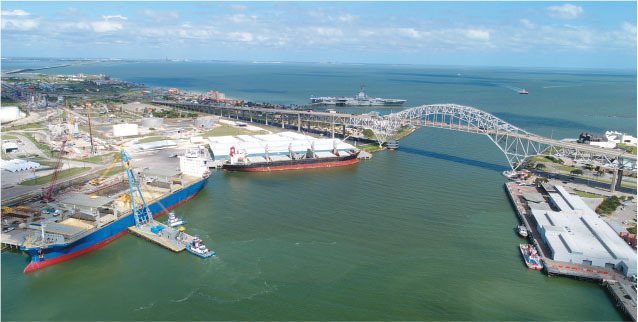
The Port of Corpus Christi Authority (PCCA) is one of the most important and invaluable seaports in the world. It is the lynchpin of domestic energy development and foreign allies that depend on a reliable source of energy to power their economies, exporting more than 60 percent of the national total crude export market. However, as our nation embarks on an energy evolution in favor of more sustainable sources of power, a lack of coherent policy from lawmakers in Washington has stymied the industry’s ability to meet current and future growing demands of customers around the world and invest in future opportunities.
The Port of Corpus Christi is on a bullish drive to lead the global market into the energy renaissance, embracing renewable energies as legitimate and sustainable commodities. The Port has focused efforts on new technologies, innovative solutions, and infrastructure development to reach full potential. In March 2022, PCCA adopted an updated environmental policy to further clarify goals and set timeframes to achieve them over the next few years as part of this initiative. PCCA has embraced energy evolution trends and is working on several projects to complement activities in traditional forms of energy.

As part of these diversification plans, PCCA has engaged in initiatives related to carbon capture utilization and sequestration and hydrogen production. In September 2021, PCCA and the Texas General Land Office signed a memorandum of understanding to co-develop a carbon dioxide (CO2) storage solution in support of national decarbonization targets. Such a solution would involve infrastructure to transport and permanently store CO2 captured by various industrial target sources in the greater Port of Corpus Christi area. Based on the findings of geological studies conducted by the University of Texas at Austin, the Texas Gulf Coast region is ideal for the injection and storage of pressurized CO2.
Similarly, as hydrogen production comes online at scale, PCCA continues to anticipate future needs and infrastructure development to support the momentum. Hydrogen exports would be another important commodity that could be exported internationally through the Port of Corpus Christi, given its expertise in crude and LNG exports. With the current Channel Improvement Project nearly complete, a depth of 54 feet will give us a competitive advantage to export hydrogen. Moreover, the Port also has large swaths of available land with access to deep water for the production and export of hydrogen.

Infrastructure development and improvements are crucial to future-proofing PCCA’s capabilities for the needs of today and tomorrow. One such project is the establishment of the first solar farm in the Port’s 100-year history. The 81,000-plus panel project, with a combined 248 acres, will have the capacity to produce 88,000 MWh of electricity per year. This renewable energy will help power operations at PCCA. A second important endeavor, the Corpus Christi Ship Channel Improvement Project, will increase the channel depth from -47 feet Mean Lower Low Water (MLLW) to -54 feet MLLW and widen it to 530 feet, with an additional 400 feet of barge shelves for the safe passage of deep-draft vessels and increased capacity for crude oil trade.
As global affairs and consumer demand continue to put pressure on the supply of energy, a coherent strategy and consistent regulatory policy are crucial for PCCA and its partners to continue their investments to future-proof energy infrastructure for the United States and its foreign allies. Inconsistent policies and an unstable political climate have hampered the implementation of new technology adoption, leading to delays and a deficit of results. We must move the energy evolution forward with regulatory reform or face the consequences in the years ahead.
 AAPA Seaports
AAPA Seaports


